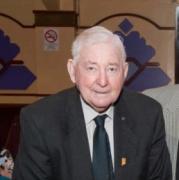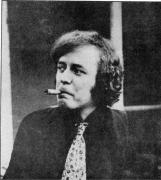|
|
||||||||||||||||||||||||
 |
Featured person
Recently added |
Paddy McFlynn (1918 - 2013): |
||||||||||||||||||||||

|
| Paddy MacFlynn |
Paddy (or Pat) McFlynn, a school headmaster by profession, was an officeholder of the Gaelic Athletic Association (GAA) for over most of his life, culminating in holding its highest office, that of President, from 1979-1982, three particularly difficult years of the Troubles in Northern Ireland, during which the Association came under certain pressures from several directions, especially arising from the 1981 hunger strikes by IRA prisoners.
Patrick Joseph McFlynn was born in May 1918 in Magherafelt, County Londonderry, youngest of four children of William J McFlynn, a publican and farmer, and Brigid, née McNicholl. He went to school in the town, first to St Joseph’s primary, then Rainey Endowed School. Rainey’s students were largely from Protestant families, but there were also many from Catholic families: at first, Mac Flynn played rugby (and played it well by account) but when he was 16, he and some friends decided to set up a GAA team in Magherafelt, which they did following a meeting on 15 April 1934 in Church Street in the town (the others were Pat Keenan, Gerry Gallagher, Paddy Collins, John Walls, John Kearns and Charlie McFlynn). It was decided to call the club after Jeremiah O’Donovan Rossa, a prominent figure in the nineteenth century, in the Irish Republican Brotherhood. A keen and able administrator as well as player, MacFlynn quickly became secretary of the county minor board; and at 21 was secretary of the GAA county board. During his tenure as county secretary, he found himself on the horns of a dilemma when during a game he was set off - a matter which according to the rules had to be automatically referred for consideration to the county board.
After school he went to London, to St Mary’s College, Strawberry Hill, London, where he played rugby, but returned to Ulster and by 1939 was a qualified teacher. He held various posts locally but was then appointed as a headmaster in County Down (St John’s Primary, Gilford). This dictated that he switch counties for GAA purposes. He also had to change club, so joined Tullylish GAC (where he was later President). Soon he was County Treasurer for Down, which had never won a senior title; in 1959 they were Ulster Senior Football Champions, and would be a further 11 times, and in 1960 they were All-Ireland Senior Football Champions (four more titles would follow; the Down Hurlers were comparatively less successful but did win four Ulster Senior titles between 1941 and 1997).
McFlynn had been Ulster Council Treasurer in 1941 and Ulster Council President 1961-1963. He settled in Laurencetown in the county, his wife Kathleen (whom he met in Ballynahinch; they married on 19 July 1949 in Ballymena) having inherited a pub favoured by sports fans – but pigeon racing, not Gaelic games. In 1979 he was elected President of the entire island-wide GAA. To mark this, a (Nationalist) member of Magherafelt District Council proposed a civic reception in his honour, but this was vetoed by the Council (which had a Unionist majority). One Westminster MP, from the Democratic Unionist Party, even wrote to McFlynn regretting his Presidency of “one of the most biased and discriminatory organisations in the country”. Mac Flynn had the letter framed.
In 1981 began a hunger strike by IRA prisoners at the Maze Prison near Belfast. The background to this situation is familiar or easily accessible; essentially the IRA wanted “special category status” for its prisoners such that they would be seen as fundamentally different from what were often referred to as “ordinary decent criminals”. The Government under Mrs Thatcher refused this. Tensions throughout the province were extremely high, and McFlynn was pressed by many members to have the GAA support the prisoners’ cause and even campaign on behalf of it. Others were against this for reasons including that the GAA was what it called itself, an Athletic Association, however Gaelic. One voice was from a representative of the Garda Síochána, the Irish police, who saw the IRA as a subversive organisation, members of which should be expelled from the GAA. There was talk of the organisation splitting, but McFlynn managed to avert this, taking the line that the GAA was a non-political organisation, it following from this that it would not be taking part in political campaigns, nor would it involve itself in witch-hunts of individual members.
McFlynn’s role, indeed his whole career, was described much later in a book he was due to launch on 25 September 2013, in Newry, County Down. He died the previous day, at home in Laurencetown. One of his successors as President of the Ulster Council, described McFlynn as “an iconic Ulster and National GAA figure, a GAA giant who had given over 80 years of volunteer service to our Association.”
| Born: | 5 May 1918 |
| Died: | 25 September 2013 |
| Richard Froggatt |
| Bibliography: Irish Times, 25 September & 5 October 2013; Alan Rodgers: Leading Through the Troubles – A Life in the GAA - Paddy MacFlynn; Belfast Telegraph, 26 September 2013; www.tullylish.com |


Home | Our Policies | Plaques | Browse | Search | Sponsors | Links | Help | Contact
Privacy & Disclaimer | Cookie Policy | Site Map | Website Design By K-Point
© 2024 Ulster History Circle









